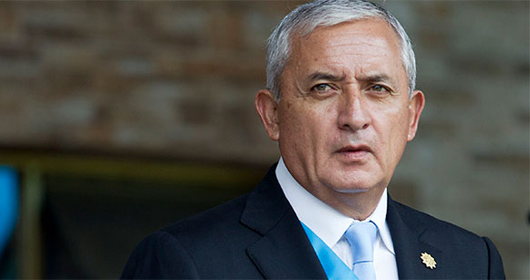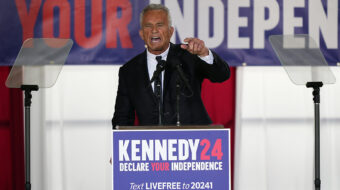
On Sept. 6 there will be general elections in Guatemala, with runoffs on Oct. 25. Voters will elect a new president to succeed Otto Perez Molina of the Patriotic Party, who is not allowed a second term. They will also elect a vice president, all 158 members of Congress and 20 for the Central American Parliament, as well as local officials,
Perez Molina, a right-wing former general, is mired in an immense corruption scandal. The leading role in the corruption investigation has been taken by the International Commission Against Impunity in Guatemala, CICIG in Spanish, working in tandem with the public prosecutor’s office.
The CICIG is a United Nations-sponsored entity which was set up in 2006 to deal with impunity in the Guatemalan justice system. In the current case, its investigations found that persons very close to the president were involved in a smuggling and tax evasion scheme; this has led to the resignation of the country’s vice president, Roxana Baldetti, plus numerous arrests.
Also, there was corruption in contracting for kidney treatment services for the health care system of the Guatemalan Institute for Social Security. Outraged citizens of all ideological persuasions have, since May, been protesting these abuses.
Scandals have touched opposition parties too. Fourteen political parties have nominated presidential candidates. Perez Molina’s own Patriotic Party (PP) is running Mario David Garcia Velasquez, a right- wing radio and TV journalist. The centrist National Unity of Hope Party (UNE) party has nominated Sandra Torres, wife of former president Alvaro Colom. The Renewed Democratic Liberty Party (LIDER) ticket is headed by businessman and death penalty enthusiast Manuel Baldizon.
On the extreme right, Zury Rios Sosa, the daughter of the former dictator, Efrain Rios Montt, will represent the fascist “Vision with Values Party.” Her candidacy is being permitted by the courts even though electoral law forbids the presidency to close relatives of people who came to power by violating the constitutional order, as Rios Montt did when he took power in a military coup in 1982.
He carried out a genocidal campaign against indigenous Ixil Maya people during his short reign. Before Rios Montt was overthrown, military forces had killed at least 1,777 Ixils, the largest single burst of murder in Guatemala’s long civil war which started when the U.S. Central Intelligence Agency overthrew the democratically elected president, Jacobo Arbenz, in 1954.
That war eventually claimed at least 200,000 civilian lives, most at the hands of the military. In 2013 Rios Montt was found guilty of genocide but the verdict was overturned on a technicality. His attorneys claim now that he is senile and unable to stand trial.
Another candidate, Jimmy Morales of the National Convergence, has been surging in polls; he is a comedian who is using social media to crystalize the general discontent with corruption to support his “nationalist” candidacy. He appears to be on the far right also, denying that there was genocide against the Ixils and, like Baldizon, promoting the death penalty.
On the right also is free-marketeer and socially conservative economist Roberto Gonzalez of the Commitment, Renovation and Order Party (CREO).
On the left, two parties are running presidential candidates: The New Republic Party (MNR) whose presidential candidate is a former member of Congress, Anibal Garcia, who was the running mate of Nobel Peace Prize winner Rigoberta Menchu when she ran for president in the last elections, in 2011.
For the Broad Left Front of the National Revolutionary Unity Party (UNRG-MAIZ) and the Winaq Party, the presidential candidate this year is Miguel Angel Sandoval, a former student activist and guerilla fighter during Guatemala’s civil war.
On July 15, the CICIG dropped another bombshell, revealing that 25 percent of Guatemala’s campaign financing has been underwritten by criminal elements, principally narcotics cartels. The CICIG report cited the LIDER party, whose vice presidential candidate, Edgar Barquin, a former president of the Bank of Guatemala, it accuses of being part of a criminal money laundering scheme. The money laundering scandal also touches others, including former President Alvaro Colom and his wife Sandra Torres, the UNE presidential candidate.
Baldizon, LIDER’s presidential candidate, angrily accused CICIG and the prosecutor of conspiring against him to undermine his lead in the polls. He ran up to Washington D.C. to complain to the Organization of American States and U.S. politicians.
Guatemala is a country of 15 and a half million, between 41 or 50 percent of whom belong to the multiple indigenous Maya nations. The Mayas developed a high civilization during antiquity, but after they were conquered by the Spanish in the 16th century, they were pushed into a subordinate economic, social and political position which persists today in one of the most unequal societies in the world.
The per-capita gross domestic product of Guatemala (Purchasing Power Parity method) is about $5,300, one of the lowest in the Western Hemisphere. Half the children under five are malnourished, and the poverty rate among indigenous people is 73 percent with 22 percent living in extreme poverty.
A recent plant disease outbreak has devastated the harvest of coffee, the major crop of many farming communities. Since peace accords that ended the civil war in 1996, and the incorporation of Guatemala in the Central American-Dominican Republic Free Trade Agreement (CAFTA-DR) in 2006, foreign direct investment in Guatemala has increased, but this has led to its own problems, as foreign companies enter into conflicts with rural communities over land and water use.
The rate of violence in Guatemala, including against women and children, is extremely high, and a situation of impunity reigns in which very few perpetrators are ever brought to book.
It is not surprising, then, that the so-called “child migrant crisis” of 2014 involved thousands of children from Guatemala as well as from Honduras and El Salvador. The Guatemalan child migrants included a high proportion of indigenous people, and more frequently gave poverty and hunger as their reasons for migrating. This crisis may repeat this year.
Reacting to the “child migrant crisis”, the United States has proposed funding a new “Alliance for Prosperity” to the tune of a billion dollars. This is currently being debated in the U.S. Congress. Part of the money would go to measures to attract more foreign direct investment to Guatemala, Honduras and El Salvador, while a considerable proportion would go to beefing up security services.
However, the massive theft of social welfare funds in both Guatemala and Honduras, and the well documented abuses by the security services, create a question as to whether the U.S. aid will in fact do more harm than good.
Without a thorough reform, the U.S. funds could end up exacerbating both corruption and repression. So far, it does not look as if the most likely winners of the presidential elections on Sept. 6 hold out promise for achieving such reform. Polls show Baldizon far ahead, followed by Torres, Morales, Rios and Gonzalez.
Various organizations have suggested that given the corruption scandal, the elections be postponed. This appears unlikely.
Photo: Otto Perez Molina, who is not allowed a second term, is currently mired in a corruption scandal. | AP

MOST POPULAR TODAY

Zionist organizations leading campaign to stop ceasefire resolutions in D.C. area

High Court essentially bans demonstrations, freedom of assembly in Deep South

U.S. imperialism’s ‘ironclad’ support for Israel increases fascist danger at home


Communist Karol Cariola elected president of Chile’s legislature






Comments